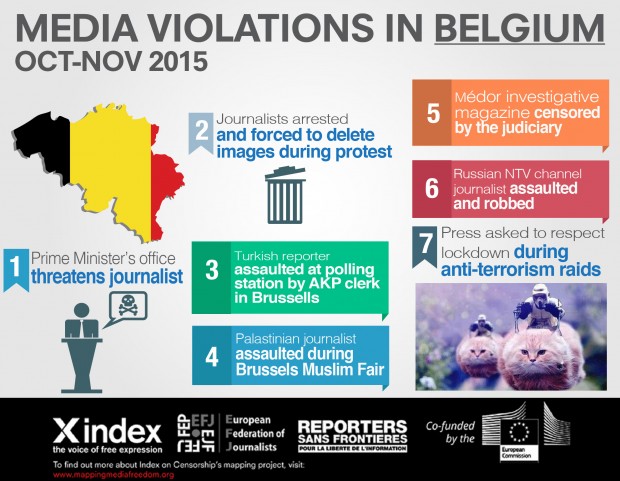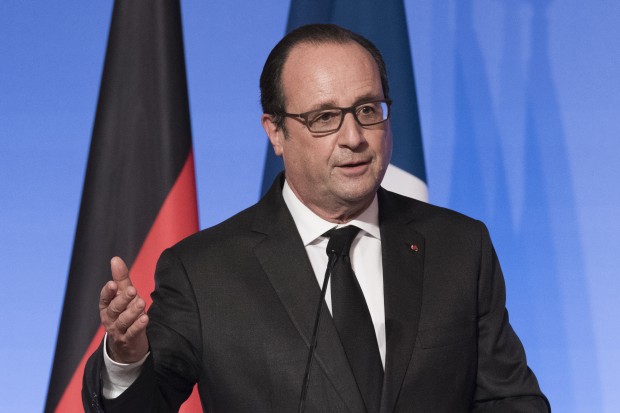3 Dec 2015 | Belgium, Europe and Central Asia, Mapping Media Freedom, mobile, News and features

Following the murderous barbarism in France last month, a state of alert was subsequently declared in Belgium amid concerns that a “Paris-style” attack was imminent in Brussels. The city went into lockdown for five days, the army was deployed on the streets, and the authorities asked the media and public not to report on what was happening.
Belgian media complied, as did Belgian Twitter users, who, under the hashtag #BrusselsLockdown, posted pictures of cats rather than comment on police raids.
The lockdown of Brussels has certainly raised some important questions. As Index on Censorship’s Mapping Media Freedom project shows, it may indicative of a wider problem of media violations within the country.
1. Prime Minister’s office threatens journalist
During the visit of Turkish President Recep Tayyip Erdoğan, Tristan Godaert, a journalist working for RTBF, the public broadcasting organisation of the French community of Belgium, was repeatedly threatened by the press secretary and the spokesperson of the Belgian Prime Minister Charles Michel while covering the visit of Turkish President Erdogan. On 6 October, during a speech by the Turkish president, Godaert shouted: “Mr. Erdoğan, why is Mohammed Rasool still in prison in Turkey?” A Turkish embassy official then a representative of the Belgian government who then informed RTBF that they were no longer allowed to film. Afterward, the Belgian Prime Minister’s communications director threatened the journalists, saying that if the footage was aired there would be “consequences”.
2. Journalists arrested and forced to delete images during protest
On 15 October, around 100 people were arrested in Brussels at a mass demonstration against TTIP (Transatlantic Trade and Investment Partnership), an impending free trade deal between the US and the EU.
During the protest, Thomas Michel, a freelance journalists working for Zin TV, and Maxime Lehoux, an Italian photojournalist, were arrested by the Belgian police and forced to delete photographs they had taken.
A press release by Zin TV following the incident said: “The images contain the humiliation of the police inflicted on protesters […] We remind that it is illegal to be seized from its sources, it is a violation of professional secrecy and the level of justification 3 of 4 on the scale of the risk of terrorism is simply bogus.”
3. Turkish reporter assaulted at polling station
R Doğan, a Cihan news agency reporter, was physically and verbally assaulted on 19 October by a polling clerk at a voting station in Turkey’s Consulate General in Brussels for the Turkish Justice and Development Party (AKP).
Doğan was insulted by the AKP clerk, who grabbed his arm and escorted him out of the building. The reporter was there to observe Turkish citizens based abroad who were voting as part of the 1 November Turkish general election.
4. Palestinian journalist assaulted during Brussels Muslim Fair
On 7 November, Palestinian journalist Salama Attaallah was assaulted while covering the annual Muslim Fair activities in Brussels for Al Ghad TV. While shooting, an individual introducing himself as a representative of Al Aqsaa demanded he stop filming women participating to the fair. Attaallah refused, explaining that he was not there to film women, but rather to report about the event in general. As a result, he was punched repeatedly in the face. The whole altercation was caught on film.
5. Médor investigative magazine censored by the judiciary
Médor a new investigative magazine in Belgium, has been censored by the Belgian judiciary at the request of a businessman representing a pharmaceutical company.
In its first issue, Médor published a story about the financial structure of the pharmaceutical company that is largely supported by regional authorities. The investigation, which lasted more than six months and compiled extensive documentation, was conducted by the award-winning David Leloup.
The Association of Professional Journalists, an EFJ-IFJ affiliate, has expressed its shock at the censorship and offered legal support to Leloup.
6. Russian NTV channel journalists assaulted and robbed
On 18 November, NTV channel reporter Konstantin Panushkin and cameraman Zakir Ansarov were beaten and robbed in northern Brussels. The Russia-based journalists were seeking to speak with relatives and friends of a jihadist-related to attacks in Paris.
Panushkin said that they were interviewing a group of 10 teenagers, when both were assaulted and robbed. The assailants took a backpack with documents, money and a laptop.
Details of attacks on the media across Europe can be found at Index on Censorship’s Mapping Media Freedom website. Reports to the map are crowdsourced and then fact-checked by the Index team.
Mapping Media Freedom
Click on the bubbles to view reports or double-click to zoom in on specific regions. The full site can be accessed at https://mappingmediafreedom.org/
|
27 Nov 2015 | Europe and Central Asia, France, Mapping Media Freedom, mobile, News and features

Editorial Credit: Frederic Legrand – COMEO / Shutterstock.com
Even before the attacks on Paris on 13 November were over, French President Francois Hollande declared a nationwide state of emergency giving authorities additional powers in the name of protecting citizens and combatting terrorism. But since the attacks, concerns have been raised for press freedom prompted by the cancellation of a regular radio segment by journalist Thomas Guénolé.
A few days after the events of 13 November, Guénolé devoted his daily morning commentary piece on RMC radio to what he perceived as the failings of the French security services and police. On the same day, the Interior Ministry called Philippe Antoine, RMC managing editor, to demand the radio station air a corrective to points Guénolé discussed during his segment, which the ministry would pen. “Interestingly, the corrective was not going to appear as a corrective emanating from the Interior Ministry but as the correction of an inaccurate information emanating from RMC,” Guénolé told me.
The proposed corrections were in relation to Guénolé’s discussion of claims reported by various news outlets, including that France had known since August 2015 that IS planned to attack a rock concert in France and that Turkish authorities had warned France twice this year about Omar Ismaïl Mostefaï, one of the assailants of the Bataclan massacre.
Guénolé called for a parliamentary investigation which should, if these claims were true, prompt the resignation of the highest ranking French officials, including Bernard Cazeneuve, France’s Minister of the Interior.
Guénolé also repeated information published by La Lettre A, which claimed only three out of 50 members of the Parisian Brigade de recherche et d’intervention (an anti-gang unit, which is to intervene in hostage situations) had been on duty after 8pm on the night of the attacks. On 19 November, the special adviser to France’s interior minister, Marie-Emmanuelle Assidon, took to Twitter to say the information contained in La Lettre A was false but recognised she had not read the article. “[N]o one but Thomas Guénolé trusts your info,” she added in her tweet.
“I have repeatedly asked Place Beauvau for a denial,” Marion Deye, editor at La Lettre A, told me. “I haven’t had one.” Neither have Le Monde or the AFP, also quoted by Guénolé.
“We published a very factual piece of news on the Monday following the attacks, at a time when any type of criticism was not welcome,” Daye said. “However, what we published was not a criticism, just a report. The most absurd thing in this whole story is that no one knows what Place Beauvau denied when they spoke to RMC. I think what was really problematic for some was that Guénolé brought up the resignation of Cazeneuve.”
On Friday 20 November, Guénolé was informed that his daily column was cancelled. In an email, the RMC managing editor wrote: “The Interior Ministry and all the police services invited on air have refused to appear on RMC because of inaccuracies in your column. Most sources of our police specialists have gone silent since Tuesday, putting in jeopardy the work that our editorial team does to find and verify information.”
Guénolé described the actions against him as both a “boycott” and an “embargo”.
“One would expect a media outlet to back up its journalist and not to have too strong a dependency vis-à-vis institutions,” he said. “My particular case doesn’t matter so much. What is unacceptable is that the Interior Ministry seems to have pressured RMC because they were displeased with what a journalist said on air in the context of the state of emergency.”
The firing of Guénolé happened on the on the same day the Assemblée Nationale voted to extend the state of emergency from 12 days to three months. Measures to control the press were initially proposed by 20 socialist MPs led by Sandrine Mazetier on the basis that the coverage of the January 2015 attacks in Paris – especially by news channel BFM-TV – had endangered the life of hostages who were hiding in a Hyper Casher supermarket. Such a measure would be highly problematic. As Mathieu Magnaudeix, a journalist with the investigative website Mediapart, put it to me: “If we were to end up with an authoritarian power, which by now doesn’t seem to be out of the question, what could they do with a law that allows the control of the press?”
Thankfully, the press control measures were later dismissed and it was made clear that even Hollande was strongly opposed. Regardless, it is apparent journalists still aren’t safe.
The proposed law does, however, extend and harden house arrests that are allowed under a state of emergency, enables members of the police force to carry their weapons while off duty, gives stronger powers to the authorities to carry police searches that are not approved by a judge. While these cannot be carried out in the workplace, police searches can take place at the house of an MP, lawyer, a judge or a journalist.
This kind of anti-terror legislation, as we have seen in the UK, could have further negative consequences for journalists covering terrorism.
Mapping Media Freedom
Click on the bubbles to view reports or double-click to zoom in on specific regions. The full site can be accessed at https://mappingmediafreedom.org/
|
2 Nov 2011 | Europe and Central Asia, Index Index, Middle East and North Africa, minipost
The Paris-based office of Charlie Hebdo, a satirical weekly magazine, was petrol-bombed early this morning [2 November] in advance of the publication of an issue “guest-edited” by prophet Mohammed, marking the victory of the Islamist Ennahda Party in Tunisia’s elections.
The special issue, which also featured a cartoon of prophet Mohammed saying “100 lashes if you don’t die of laughter!” on the front page, was scheduled to hit news stands today. The magazine’s website was also reported to have been hacked, with a message in English and Turkish condemning the publication. In 2007, the weekly reprinted the widely-protested cartoons of prophet Muhammad, which were published by the Danish newspaper Jyllands Posten.


